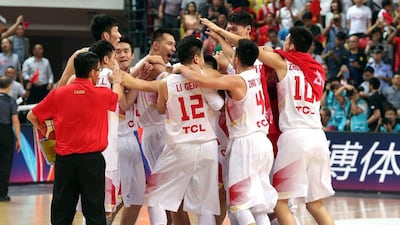There’s no real need to get complicated with this, no analytical or observational insight necessary. Plenty large and plenty bright, China’s record of nine played, nine won at the 2015 Fiba Asia Championships speaks clearly enough on its own.
Through two group rounds and three knockout matches, the hosts of the continental championship were never truly challenged, not even in the final. A feisty Philippines side will regret some costly mistakes and unfortunate calls, but the final 78-67 scoreline, making the Chinese gold medal winners and Olympics-bound, isn’t entirely unjust.
They had as much size as any team in the tournament, with four players standing 7ft 0in (2.13m) or taller. It wasn’t even just the giants, though, with big, quick guards and forwards that gave them the most traditional-looking squad in a, in some ways, misfit field.
They had shooting touch, some emergent playmaking creativity, and defensive solidity. It’s almost impossible to say how they might do at the Olympics, as it is, because they were so unparalleled by their continental peers. Only one team was within 10 of the Chinese throughout the tournament, South Korea.
On Saturday in the Fiba Asia gold-medal game they simply overwhelmed the Filipinos. Their depth was too much.
Throughout the competition, Guo Ailun flashed a quality all-round game at point guard, sprinkling in enough scoring touch around his natural preference for floor-directing to count as a quiet force for the team. Li Gen thrived in a space-creating role, drilling 54.5 per cent of his three-point attempts. Zhai Xiaochun, Zhou Peng and Ding Yanyuhang were long-armed defensive menaces on the perimeter, 3-and-D specialists who gave China a breadth no other team could claim.
And, of course, there were the giants. Yi Jianlian was China’s steely centre of gravity throughout much of the tournament, well and away leading the team in scoring as he provided reassuring easy buckets down low and stifled the often smaller opposition inside. He was only outshone in the sense that Zhou Qi was revelatory, with 16 points and 14 rebounds in the final to add to his earlier 21-point, eight-board highlight reel in the Korea contest. He was for the most part active down low, flashing decent footwork and a good sense for how to get his lanky 7ft 1in frame up to the basket unimpeded.
Wang Zhelin, Ji Wei Zhao and Liu Wei gave the Chinese depth to flesh out a genuinely complete and quality team.
Now let’s step back just a little bit.
If we’re talking the broader global order, there’s probably no upending in store for Rio 2016. The Chinese bigs are rail-thin, and will undoubtedly find things difficult down low, trying to match the strength of the likes of Greece or Turkey or France, to say nothing of the United States or Spain.
Their creativity in playmaking is emergent – not fully-formed. They can get caught in uncertainty more frequently than they should, they play a bit more conservatively at times than you’d expect to see from, say, Olympics medal-contenders, and they simply aren’t as explosive across the board as NBA-level or other top European players.
But they do a lot of interesting things. They shot a very decent 39.4 per cent from three throughout the tournament, they showed a keen knack for getting to the foul line, where they took easily the most attempts of the tournament and shot 72.2 per cent. They have the requisite length that comes with their enviable size, and perhaps as interesting as anything was that they brought a team to Changsha that featured six important contributors age 22 or younger, including the 19-year-old Qi.
They have another year to grow for the Rio Olympics, and then they have another four years to really fill out a threatening team for Tokyo in 2020.
In any case, whether then or farther in the future, it would figure to be a near statistical certainty that some Chinese team will arrive at an eventual Olympics and rearrange international basketball’s power structure.
Ten years ago China put in a more ruthless showing in this same tournament. Yao Ming was the MVP. It’d be not unreasonable to ask how this is any different.
But the differences are indeed significant. Iran have grown into a genuinely good team in the last decade, and were winners of three of the last four of these tournaments. The Philippines didn’t even qualify for that tournament, and had a real, NBA-level big man in Andray Blatche leading a talented squad in Saturday’s final. They never appeared to really have a chance. South Korea and Japan brought competitive teams.
The standard of basketball in Asia isn’t going to flood the NBA anytime soon, but it’s slowly on the rise – and in China’s case, the eye exam would say more quickly on the rise.
If anything about this dominant Fiba Asia Championships run can be gleaned, it’s that China are coming in basketball. It’s really only a matter of time until they arrive.
Follow us on Twitter @NatSportUAE

